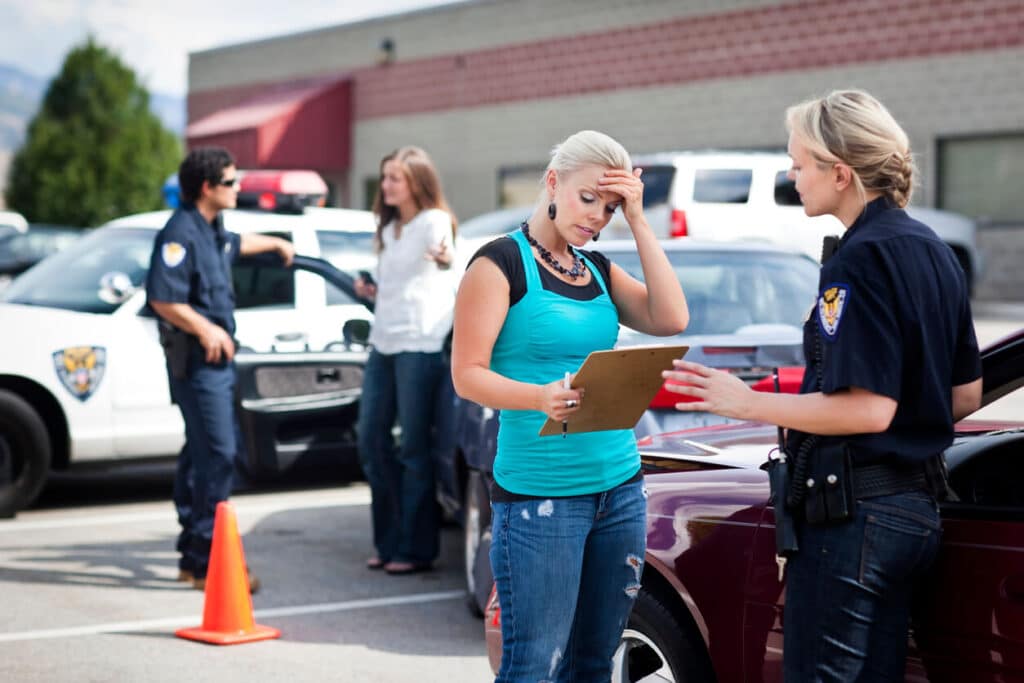Preparing Your Auto Accident Case
Explaining The Criminal vs Civil Process
One of the most common questions asked by those who have been injured in an auto accident in which the other driver was arrested is whether the criminal prosecution process either hinders or even precludes the injured party or parties from enforcing their own legal rights in civil court with a claim for damages. Below is an overview of this issue.
Civil Claims Do Not Need to Wait for the Prosecution to Be Complete
When an auto accident occurs and one of the drivers is arrested, the criminal prosecution process does not wait to get started. The wheels of government start to turn immediately, and this is how things proceed whether the injured party wants to file a lawsuit for personal injury or not. The bottom line in these situations is that the injured party does not have to wait for the criminal prosecution to be completed before he or she attempts to enforce his or her own legal rights. The person who’s been wronged can also file a claim immediately, although in some cases it may be advantageous to allow the prosecutorial process to play out.
A Conviction Can Be Powerful Evidence
One fact to consider is that when someone is prosecuted for criminal charges, the government needs to prove these charges with the highest standard of proof in existence. Specifically, the prosecution’s case must be proven beyond a reasonable doubt. Therefore, if the defendant is convicted, it’s proof that he or she committed the crime of which he or she was accused even though the standard of proof was difficult to meet.
The Process Of Discovery
One of these aspects of a Florida personal injury lawsuit is known as discovery, and this process always takes place after the lawsuit is filed and before the case goes to trial. Discovery is a highly technical and strategic process that should be handled by Miami car accident lawyers who have an intimate understanding of this process.
Below is a brief description of how discovery generally works.
The Gathering of Evidence
One of the first steps that’s taken in furtherance of the discovery process is when the lawyers who are handling the injured person’s case gather and organize the evidence that will bolster their case. This evidence can include the police report of the accident, witness statements and witness contact information, medical reports, medical bills, insurance claims and correspondence, and potentially many other items. These items are the foundation of the evidence that will be used, and they must be organized and analyzed in terms of what will be useful, what will not be useful and what will or will not likely be admissible in court.
The Exchange of Evidence
The next step in the discovery process is the exchange of evidence between the parties. This evidence exchange is governed by rules of civil procedure, and certain items are generally requested in official court documents and exchanged properly. If either party excludes certain types of evidence that is supposed to be exchanged, it could lead to serious problems for the party that does not share this evidence.
Depositions
Many times, depositions are scheduled and completed. Depositions are basically preliminary testimony and statements from witnesses to the accident, from the parties involved in the accident and perhaps even the police and medical professionals who were involved in the aftermath of the collision. The deposition testimony is used by both sides to prepare for trial, and this testimony can be critical in regards to the ultimate result of the case.
Explaining The Nature Of Evidence
Almost every Florida personal injury lawsuit that follows a car accident will turn one way or the other on the evidence that’s available to each party. Below is a look at some of the issues that can arise in regards to this evidence and why these claims should be handled by auto accident lawyers who handle these situations every day.
Deciding What’s Admissible
Despite the fact that many people think that anything even somewhat related to the Miami car accident in question would be relevant evidence at trial, the fact is that rules of evidence and strategic challenges to certain pieces of evidence can preclude some of these pieces from being used in trial. Analyzing the evidence available before a lawsuit is even filed to make as accurate a determination as possible as to what evidence will likely be admitted in court is a critical decision that can directly affect the result of the case. This analysis needs to be completed by Miami auto accident lawyers who have extensive trial experience.
After a Verdict is Rendered
After a court issues a verdict that’s favorable to the plaintiff, the next step that should be taken involves recording that judgment with the court. This recording process creates a priority for that claim if the defendant should ever file for bankruptcy, as the higher on the priority list such a claim is, the more likely it is that the plaintiff will recover those damages. Failure to record such a judgment could create enormous unforeseen problems in the future.
Dealing with Appeals
In cases where especially large verdicts are rendered in favor of a plaintiff in a Florida personal injury case, a common response by defense attorneys is to appeal that verdict. If nothing else, the filing of this appeal will delay the process of payment and perhaps provide a bit of wiggle room for the defense to negotiate a lower amount with the threat of bankruptcy as a bargaining position. Florida car accident lawyers are very familiar with this tactic and understand how to handle it properly.
Collection Steps that Could Be Necessary
If a verdict is rendered that goes beyond any limits provided by the defendant’s insurance coverage, the remaining amount of that judgment is the responsibility of the defendant personally. Therefore, if the defendant is unable to pay that amount, the help of Florida car accident lawyers could be necessary to complete steps that include the filing of a lien on the defendant’s property, filing for the garnishment of the defendant’s wages and other steps that are intended to prompt payments from the defendant who owes the plaintiff money.
The Statute of Limitations
When someone is injured because of someone else’s negligence, they often hear that he or she needs to contact a personal injury lawyer as soon as possible. There are many reasons for this communicated sense of urgency, including the fact that evidence is most easily gathered and organized when it’s readily available and when testimony is fresh in witnesses’ minds.
However, there is another reason that someone who has been injured should contact an experienced personal injury lawyer as soon as possible, and that urgency deals with a reality of Florida law known as the statute of limitations. Below is a brief explanation of this notion.
A Statute of Limitations Is a Time Limit
Basically, a statute of limitations is a time limit within which a Florida personal injury lawsuit must be filed. Generally, this time limit begins to run from the date that the injury occurred, and if someone who has been harmed by someone else files a lawsuit after this time limit has expired, the case will be dismissed as a matter of law even if it’s abundantly clear that the would-be defendant is liable for negligence.
Examples of Florida Statutes of Limitations
There are different time limits attached to different types of Florida personal injury lawsuits. For instance, ‘general’ personal injury lawsuits that include such situations as car accidents carry a four-year statute of limitations. For other Florida, personal injury lawsuits that include medical malpractice claims and libel or slander must be filed within two years of the date that the injury was inflicted.
Tolling of the Florida Statute of Limitations
While the time limits surrounding these statutes are generally hard and fast, there are exceptions to them. One such exception involves a concept known as tolling. What this basically means is that if a person who has been injured did not discover the injury and could not have discovered the injury until a later date, the statute of limitations will toll, or not begin to run, until the date that the plaintiff either discovered or should have discovered the injury.
Related Articles:
- How Car Accident Cases Are Settled
- How Much is the Average Car Accident Settlement?
- Compensation For Car Accident Injury Claims
About the Author

Jack G. Bernstein, ESQ.
Jack Bernstein is a hard-working and highly motivated personal injury attorney in Miami, Florida with over three decades of experience. He is a strategist and idea person, with a genuine passion for helping his firm’s clients. If you’ve been injured, contact Jack Bernstein today for a free evaluation of your case.

